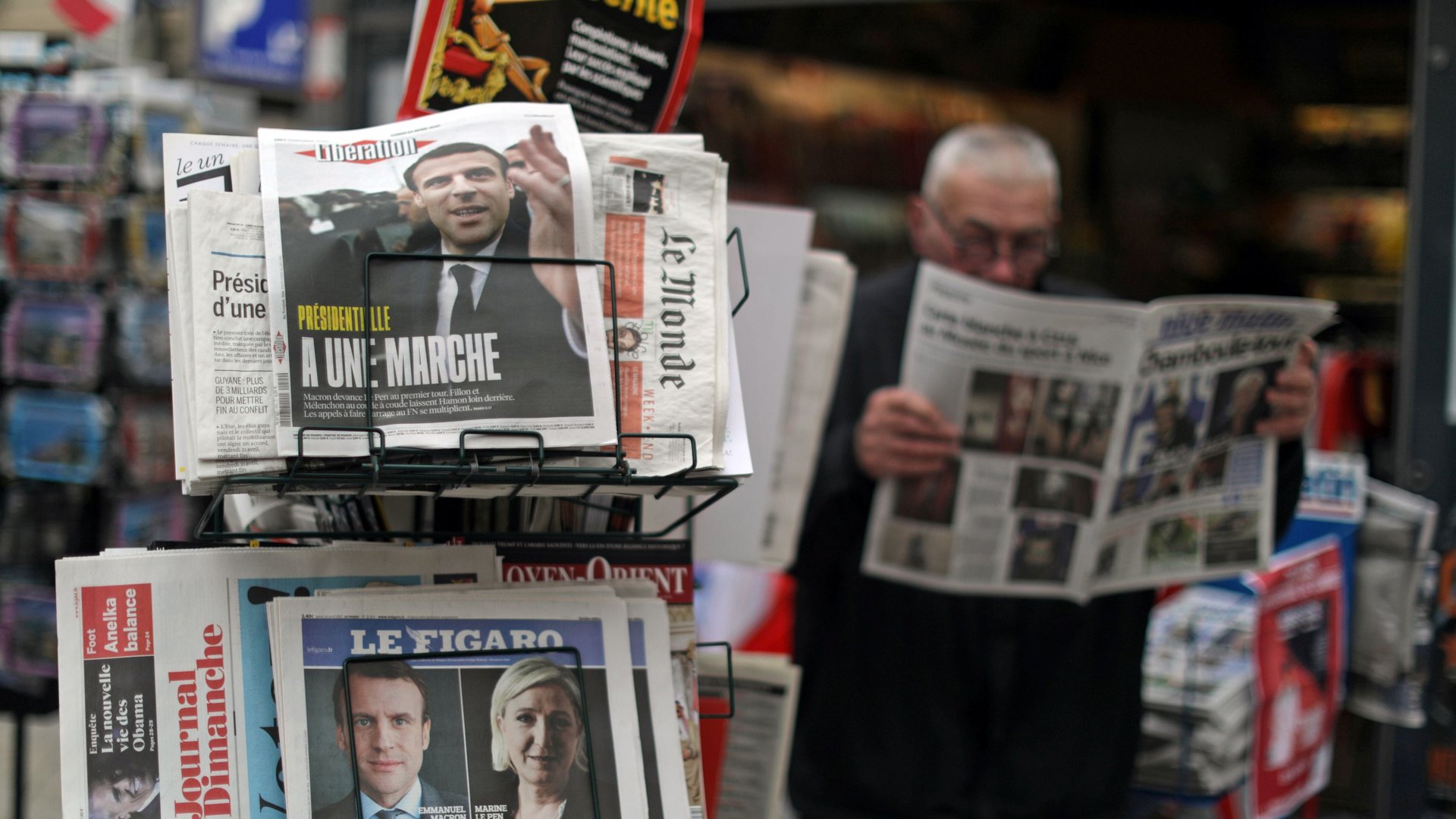Journalists shouldn’t report on the contents of Macron’s leaked documents, for democracy’s sake
There are some things that journalists can have principled reasons for not covering, such as the private lives of minor children of government officials.


There are some things that journalists can have principled reasons for not covering, such as the private lives of minor children of government officials.
Now there’s an argument that they should refrain from disclosing the contents of political candidates’ confidential documents and communications when hackers obtain and leak them in the run-up to elections. This is a dilemma right now for media around the world, after French presidential front-runner Emmanuel Macron acknowledged today that a trove of internal campaign materials was posted online ahead of the decisive May 7 election. Macron’s political party has reportedly (link in French) been subject in recent months to cyber attacks and intrusions emanating from Ukraine and Russia.
A year ago we wouldn’t have been comfortable arguing that journalists should hold back from reporting on and analyzing any such materials they were given. It would be a failure to do their jobs, on the principle that such reporting helps citizens make informed choices when they vote. But this is a brave new world, where hackers based in Russia and elsewhere are actively trying to undermine democracy by releasing, at carefully chosen moments, information stolen from the candidates they’re looking to undermine.
In 2014, many media organizations chose to censor ISIL videos of captives being beheaded, on the grounds that showing them merely rewarded the terrorists. We argue that in the run-up to an election, the media must think seriously about whether reporting on leaked documents serves a watchdog function or merely rewards hackers and leakers. If it seems to be the latter, they should consider not publishing.
This is admittedly a hard line to draw—much harder than in the case of beheading videos, the airing of which has no discernible journalistic value. It’s not going to always be clear when a leak is by malicious hackers and when it’s by well-meaning whistleblowers. Not reporting on the material can smack of taking sides, as it means effectively sheltering one candidate—in this case, moderate Macron against right-wing Marine Le Pen. Also, shouldn’t journalists just report out the material and trust that voters are intelligent enough to decide?
There are other obvious problems. How far ahead of an election should the cut-off point be? One answer might be: long enough to analyze the leaked material and work it out whether it’s real or fake—or, as appears to be the case with the Macron leak, a mixture of both—and whether there’s journalistic value in reporting it. But that may not be clear until the analysis is done, and the time it takes will also depend on how much material there is.
In short, this is an ethical minefield. But ignoring the issue is ethically dubious too. Hackers wouldn’t mount such efforts if they didn’t think they could sway elections. US intelligence agencies, for example, have said that Russian president Vladimir Putin ordered the hacking of people in Hillary Clinton’s campaign with the aim of helping president Donald Trump win. What if Clinton’s campaign emails, which contained embarrassing revelations, had leaked just before the US election instead of months earlier? The case that Russia had swung the election to Trump would have been much clearer-cut. And so would the media’s (unwitting) role in helping.
In any case, news organizations already take decisions to self-censor over leaks that could be politically explosive. Last year, well before the US election, a dossier compiled by a former British spy began making the rounds of journalists in Washington, DC. It said the Russian government had been “cultivating, supporting, and assisting” Trump and had assembled lurid kompromat on him, which the dossier included. Word of the report did make it into the press, but not until January did Buzzfeed decide to put it out. Until then, everyone who saw the dossier had evidently decided that publishing it—especially before the election—would have been irresponsible, if only because they couldn’t independently verify the most troubling allegations.
France’s government has asked media (link in French) to refrain from reporting on the leaked Macron campaign documents, noting that the publication of false information could bring penalties. A legal blackout on campaigning and reporting during the election weekend could also reduce the impact of the leak—though international media easily accessible online by French voters don’t face the same restrictions. And early analysis of the documents by one French news organization (link in French) didn’t turn up anything even vaguely incriminating.
But the democratic process is too important to allow external groups to control the discussion around elections at critical moments through illegal tactics. The aggressiveness of efforts to manipulate elections in places like France means that in some limited cases, less reporting might be better than more.